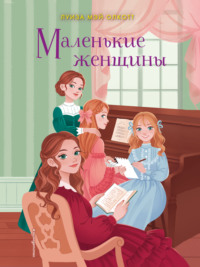 полная версия
полная версияLittle Women: or, Meg, Jo, Beth, and Amy
"Do you care to dance?"
"One usually does at a ball."
Her amazed look and quick answer caused Laurie to repair his error as fast as possible.
"I meant the first dance. May I have the honor?"
"I can give you one if I put off the Count. He dances divinely; but he will excuse me, as you are an old friend," said Amy, hoping that the name would have a good effect, and show Laurie that she was not to be trifled with.
"Nice little boy, but rather a short Pole to support
"'A daughter of the gods,
Divinely tall, and most divinely fair,'"
was all the satisfaction she got, however.
The set in which they found themselves was composed of English, and Amy was compelled to walk decorously through a cotillon, feeling all the while as if she could dance the Tarantula with a relish. Laurie resigned her to the "nice little boy," and went to do his duty to Flo, without securing Amy for the joys to come, which reprehensible want of forethought was properly punished, for she immediately engaged herself till supper, meaning to relent if he then gave any signs of penitence. She showed him her ball-book with demure satisfaction when he strolled, instead of rushing, up to claim her for the next, a glorious polka-redowa; but his polite regrets didn't impose upon her, and when she gallopaded away with the Count, she saw Laurie sit down by her aunt with an actual expression of relief.
That was unpardonable; and Amy took no more notice of him for a long while, except a word now and then, when she came to her chaperon, between the dances, for a necessary pin or a moment's rest. Her anger had a good effect, however, for she hid it under a smiling face, and seemed unusually blithe and brilliant. Laurie's eyes followed her with pleasure, for she neither romped nor sauntered, but danced with spirit and grace, making the delightsome pastime what it should be. He very naturally fell to studying her from this new point of view; and, before the evening was half over, had decided that "little Amy was going to make a very charming woman."
It was a lively scene, for soon the spirit of the social season took possession of every one, and Christmas merriment made all faces shine, hearts happy, and heels light. The musicians fiddled, tooted, and banged as if they enjoyed it; everybody danced who could, and those who couldn't admired their neighbors with uncommon warmth. The air was dark with Davises, and many Joneses gambolled like a flock of young giraffes. The golden secretary darted through the room like a meteor, with a dashing Frenchwoman, who carpeted the floor with her pink satin train. The Serene Teuton found the supper-table, and was happy, eating steadily through the bill of fare, and dismayed the garçons by the ravages he committed. But the Emperor's friend covered himself with glory, for he danced everything, whether he knew it or not, and introduced impromptu pirouettes when the figures bewildered him. The boyish abandon of that stout man was charming to behold; for, though he "carried weight," he danced like an india-rubber ball. He ran, he flew, he pranced; his face glowed, his bald head shone; his coat-tails waved wildly, his pumps actually twinkled in the air, and when the music stopped, he wiped the drops from his brow, and beamed upon his fellow-men like a French Pickwick without glasses.
Amy and her Pole distinguished themselves by equal enthusiasm, but more graceful agility; and Laurie found himself involuntarily keeping time to the rhythmic rise and fall of the white slippers as they flew by as indefatigably as if winged. When little Vladimir finally relinquished her, with assurances that he was "desolated to leave so early," she was ready to rest, and see how her recreant knight had borne his punishment.
It had been successful; for, at three-and-twenty, blighted affections find a balm in friendly society, and young nerves will thrill, young blood dance, and healthy young spirits rise, when subjected to the enchantment of beauty, light, music, and motion. Laurie had a waked-up look as he rose to give her his seat; and when he hurried away to bring her some supper, she said to herself, with a satisfied smile, —
"Ah, I thought that would do him good!"
"You look like Balzac's 'Femme peinte par elle-même,'" he said, as he fanned her with one hand, and held her coffee-cup in the other.
"My rouge won't come off;" and Amy rubbed her brilliant cheek, and showed him her white glove with a sober simplicity that made him laugh outright.
"What do you call this stuff?" he asked, touching a fold of her dress that had blown over his knee.
"Illusion."
"Good name for it; it's very pretty – new thing, isn't it?"
"It's as old as the hills; you have seen it on dozens of girls, and you never found out that it was pretty till now —stupide!"
"I never saw it on you before, which accounts for the mistake, you see."
"None of that, it is forbidden; I'd rather take coffee than compliments just now. No, don't lounge, it makes me nervous."
Laurie sat bolt upright, and meekly took her empty plate, feeling an odd sort of pleasure in having "little Amy" order him about; for she had lost her shyness now, and felt an irresistible desire to trample on him, as girls have a delightful way of doing when lords of creation show any signs of subjection.
"Where did you learn all this sort of thing?" he asked, with a quizzical look.
"As 'this sort of thing' is rather a vague expression, would you kindly explain?" returned Amy, knowing perfectly well what he meant, but wickedly leaving him to describe what is indescribable.
"Well – the general air, the style, the self-possession, the – the – illusion – you know," laughed Laurie, breaking down, and helping himself out of his quandary with the new word.
Amy was gratified, but, of course, didn't show it, and demurely answered, "Foreign life polishes one in spite of one's self; I study as well as play; and as for this" – with a little gesture toward her dress – "why, tulle is cheap, posies to be had for nothing, and I am used to making the most of my poor little things."
Amy rather regretted that last sentence, fearing it wasn't in good taste; but Laurie liked her the better for it, and found himself both admiring and respecting the brave patience that made the most of opportunity, and the cheerful spirit that covered poverty with flowers. Amy did not know why he looked at her so kindly, nor why he filled up her book with his own name, and devoted himself to her for the rest of the evening, in the most delightful manner; but the impulse that wrought this agreeable change was the result of one of the new impressions which both of them were unconsciously giving and receiving.
XXXVIII
ON THE SHELF
In France the young girls have a dull time of it till they are married, when "Vive la liberté" becomes their motto. In America, as every one knows, girls early sign the declaration of independence, and enjoy their freedom with republican zest; but the young matrons usually abdicate with the first heir to the throne, and go into a seclusion almost as close as a French nunnery, though by no means as quiet. Whether they like it or not, they are virtually put upon the shelf as soon as the wedding excitement is over, and most of them might exclaim, as did a very pretty woman the other day, "I'm as handsome as ever, but no one takes any notice of me because I'm married."
Not being a belle or even a fashionable lady, Meg did not experience this affliction till her babies were a year old, for in her little world primitive customs prevailed, and she found herself more admired and beloved than ever.
As she was a womanly little woman, the maternal instinct was very strong, and she was entirely absorbed in her children, to the utter exclusion of everything and everybody else. Day and night she brooded over them with tireless devotion and anxiety, leaving John to the tender mercies of the help, for an Irish lady now presided over the kitchen department. Being a domestic man, John decidedly missed the wifely attentions he had been accustomed to receive; but, as he adored his babies, he cheerfully relinquished his comfort for a time, supposing, with masculine ignorance, that peace would soon be restored. But three months passed, and there was no return of repose; Meg looked worn and nervous, the babies absorbed every minute of her time, the house was neglected, and Kitty, the cook, who took life "aisy," kept him on short commons. When he went out in the morning he was bewildered by small commissions for the captive mamma; if he came gayly in at night, eager to embrace his family, he was quenched by a "Hush! they are just asleep after worrying all day." If he proposed a little amusement at home, "No, it would disturb the babies." If he hinted at a lecture or concert, he was answered with a reproachful look, and a decided "Leave my children for pleasure, never!" His sleep was broken by infant wails and visions of a phantom figure pacing noiselessly to and fro in the watches of the night; his meals were interrupted by the frequent flight of the presiding genius, who deserted him, half-helped, if a muffled chirp sounded from the nest above; and when he read his paper of an evening, Demi's colic got into the shipping-list, and Daisy's fall affected the price of stocks, for Mrs. Brooke was only interested in domestic news.
The poor man was very uncomfortable, for the children had bereft him of his wife; home was merely a nursery, and the perpetual "hushing" made him feel like a brutal intruder whenever he entered the sacred precincts of Babyland. He bore it very patiently for six months, and, when no signs of amendment appeared, he did what other paternal exiles do, – tried to get a little comfort elsewhere. Scott had married and gone to housekeeping not far off, and John fell into the way of running over for an hour or two of an evening, when his own parlor was empty, and his own wife singing lullabies that seemed to have no end. Mrs. Scott was a lively, pretty girl, with nothing to do but be agreeable, and she performed her mission most successfully. The parlor was always bright and attractive, the chessboard ready, the piano in tune, plenty of gay gossip, and a nice little supper set forth in tempting style.
John would have preferred his own fireside if it had not been so lonely; but as it was, he gratefully took the next best thing, and enjoyed his neighbor's society.
Meg rather approved of the new arrangement at first, and found it a relief to know that John was having a good time instead of dozing in the parlor, or tramping about the house and waking the children. But by and by, when the teething worry was over, and the idols went to sleep at proper hours, leaving mamma time to rest, she began to miss John, and find her work-basket dull company, when he was not sitting opposite in his old dressing-gown, comfortably scorching his slippers on the fender. She would not ask him to stay at home, but felt injured because he did not know that she wanted him without being told, entirely forgetting the many evenings he had waited for her in vain. She was nervous and worn out with watching and worry, and in that unreasonable frame of mind which the best of mothers occasionally experience when domestic cares oppress them. Want of exercise robs them of cheerfulness, and too much devotion to that idol of American women, the teapot, makes them feel as if they were all nerve and no muscle.
"Yes," she would say, looking in the glass, "I'm getting old and ugly; John doesn't find me interesting any longer, so he leaves his faded wife and goes to see his pretty neighbor, who has no incumbrances. Well, the babies love me; they don't care if I am thin and pale, and haven't time to crimp my hair; they are my comfort, and some day John will see what I've gladly sacrificed for them, won't he, my precious?"
To which pathetic appeal Daisy would answer with a coo, or Demi with a crow, and Meg would put by her lamentations for a maternal revel, which soothed her solitude for the time being. But the pain increased as politics absorbed John, who was always running over to discuss interesting points with Scott, quite unconscious that Meg missed him. Not a word did she say, however, till her mother found her in tears one day, and insisted on knowing what the matter was, for Meg's drooping spirits had not escaped her observation.
"I wouldn't tell any one except you, mother; but I really do need advice, for, if John goes on so much longer I might as well be widowed," replied Mrs. Brooke, drying her tears on Daisy's bib, with an injured air.
"Goes on how, my dear?" asked her mother anxiously.
"He's away all day, and at night, when I want to see him, he is continually going over to the Scotts'. It isn't fair that I should have the hardest work, and never any amusement. Men are very selfish, even the best of them."
"So are women; don't blame John till you see where you are wrong yourself."
"But it can't be right for him to neglect me."
"Don't you neglect him?"
"Why, mother, I thought you'd take my part!"
"So I do, as far as sympathizing goes; but I think the fault is yours, Meg."
"I don't see how."
"Let me show you. Did John ever neglect you, as you call it, while you made it a point to give him your society of an evening, his only leisure time?"
"No; but I can't do it now, with two babies to tend."
"I think you could, dear; and I think you ought. May I speak quite freely, and will you remember that it's mother who blames as well as mother who sympathizes?"
"Indeed I will! Speak to me as if I were little Meg again. I often feel as if I needed teaching more than ever since these babies look to me for everything."
Meg drew her low chair beside her mother's, and, with a little interruption in either lap, the two women rocked and talked lovingly together, feeling that the tie of motherhood made them more one than ever.
"You have only made the mistake that most young wives make, – forgotten your duty to your husband in your love for your children. A very natural and forgivable mistake, Meg, but one that had better be remedied before you take to different ways; for children should draw you nearer than ever, not separate you, as if they were all yours, and John had nothing to do but support them. I've seen it for some weeks, but have not spoken, feeling sure it would come right in time."
"I'm afraid it won't. If I ask him to stay, he'll think I'm jealous; and I wouldn't insult him by such an idea. He doesn't see that I want him, and I don't know how to tell him without words."
"Make it so pleasant he won't want to go away. My dear, he's longing for his little home; but it isn't home without you, and you are always in the nursery."
"Oughtn't I to be there?"
"Not all the time; too much confinement makes you nervous, and then you are unfitted for everything. Besides, you owe something to John as well as to the babies; don't neglect husband for children, don't shut him out of the nursery, but teach him how to help in it. His place is there as well as yours, and the children need him; let him feel that he has his part to do, and he will do it gladly and faithfully, and it will be better for you all."
"You really think so, mother?"
"I know it, Meg, for I've tried it; and I seldom give advice unless I've proved its practicability. When you and Jo were little, I went on just as you are, feeling as if I didn't do my duty unless I devoted myself wholly to you. Poor father took to his books, after I had refused all offers of help, and left me to try my experiment alone. I struggled along as well as I could, but Jo was too much for me. I nearly spoilt her by indulgence. You were poorly, and I worried about you till I fell sick myself. Then father came to the rescue, quietly managed everything, and made himself so helpful that I saw my mistake, and never have been able to get on without him since. That is the secret of our home happiness: he does not let business wean him from the little cares and duties that affect us all, and I try not to let domestic worries destroy my interest in his pursuits. Each do our part alone in many things, but at home we work together, always."
"It is so, mother; and my great wish is to be to my husband and children what you have been to yours. Show me how; I'll do anything you say."
"You always were my docile daughter. Well, dear, if I were you, I'd let John have more to do with the management of Demi, for the boy needs training, and it's none too soon to begin. Then I'd do what I have often proposed, let Hannah come and help you; she is a capital nurse, and you may trust the precious babies to her while you do more housework. You need the exercise, Hannah would enjoy the rest, and John would find his wife again. Go out more; keep cheerful as well as busy, for you are the sunshine-maker of the family, and if you get dismal there is no fair weather. Then I'd try to take an interest in whatever John likes, – talk with him, let him read to you, exchange ideas, and help each other in that way. Don't shut yourself up in a bandbox because you are a woman, but understand what is going on, and educate yourself to take your part in the world's work, for it all affects you and yours."
"John is so sensible, I'm afraid he will think I'm stupid if I ask questions about politics and things."
"I don't believe he would; love covers a multitude of sins, and of whom could you ask more freely than of him? Try it, and see if he doesn't find your society far more agreeable than Mrs. Scott's suppers."
"I will. Poor John! I'm afraid I have neglected him sadly, but I thought I was right, and he never said anything."
"He tried not to be selfish, but he has felt rather forlorn, I fancy. This is just the time, Meg, when young married people are apt to grow apart, and the very time when they ought to be most together; for the first tenderness soon wears off, unless care is taken to preserve it; and no time is so beautiful and precious to parents as the first years of the little lives given them to train. Don't let John be a stranger to the babies, for they will do more to keep him safe and happy in this world of trial and temptation than anything else, and through them you will learn to know and love one another as you should. Now, dear, good-by; think over mother's preachment, act upon it if it seems good, and God bless you all!"
Meg did think it over, found it good, and acted upon it, though the first attempt was not made exactly as she planned to have it. Of course the children tyrannized over her, and ruled the house as so on as they found out that kicking and squalling brought them whatever they wanted. Mamma was an abject slave to their caprices, but papa was not so easily subjugated, and occasionally afflicted his tender spouse by an attempt at paternal discipline with his obstreperous son. For Demi inherited a trifle of his sire's firmness of character, – we won't call it obstinacy, – and when he made up his little mind to have or to do anything, all the king's horses and all the king's men could not change that pertinacious little mind. Mamma thought the dear too young to be taught to conquer his prejudices, but papa believed that it never was too soon to learn obedience; so Master Demi early discovered that when he undertook to "wrastle" with "parpar," he always got the worst of it; yet, like the Englishman, Baby respected the man who conquered him, and loved the father whose grave "No, no," was more impressive than all mamma's love-pats.
A few days after the talk with her mother, Meg resolved to try a social evening with John; so she ordered a nice supper, set the parlor in order, dressed herself prettily, and put the children to bed early, that nothing should interfere with her experiment. But, unfortunately, Demi's most unconquerable prejudice was against going to bed, and that night he decided to go on a rampage; so poor Meg sung and rocked, told stories and tried every sleep-provoking wile she could devise, but all in vain, the big eyes wouldn't shut; and long after Daisy had gone to byelow, like the chubby little bunch of good-nature she was, naughty Demi lay staring at the light, with the most discouragingly wide-awake expression of countenance.
"Will Demi lie still like a good boy, while mamma runs down and gives poor papa his tea?" asked Meg, as the hall-door softly closed, and the well-known step went tiptoeing into the dining-room.
"Me has tea!" said Demi, preparing to join in the revel.
"No; but I'll save you some little cakies for breakfast, if you'll go bye-by like Daisy. Will you, lovey?"
"Iss!" and Demi shut his eyes tight, as if to catch sleep and hurry the desired day.
Taking advantage of the propitious moment, Meg slipped away, and ran down to greet her husband with a smiling face, and the little blue bow in her hair which was his especial admiration. He saw it at once, and said, with pleased surprise, —
"Why, little mother, how gay we are to-night. Do you expect company?"
"Only you, dear."
"Is it a birthday, anniversary, or anything?"
"No; I'm tired of being a dowdy, so I dressed up as a change. You always make yourself nice for table, no matter how tired you are; so why shouldn't I when I have the time?"
"I do it out of respect to you, my dear," said old-fashioned John.
"Ditto, ditto, Mr. Brooke," laughed Meg, looking young and pretty again, as she nodded to him over the teapot.
"Well, it's altogether delightful, and like old times. This tastes right. I drink your health, dear." And John sipped his tea with an air of reposeful rapture, which was of very short duration, however; for, as he put down his cup, the door-handle rattled mysteriously, and a little voice was heard, saying impatiently, —
"Opy doy; me's tummin!"
"It's that naughty boy. I told him to go to sleep alone, and here he is, downstairs, getting his death a-cold pattering over that canvas," said Meg, answering the call.
"Mornin' now," announced Demi, in a joyful tone, as he entered, with his long night-gown gracefully festooned over his arm, and every curl bobbing gayly as he pranced about the table, eying the "cakies" with loving glances.
"No, it isn't morning yet. You must go to bed, and not trouble poor mamma; then you can have the little cake with sugar on it."
"Me loves parpar," said the artful one, preparing to climb the paternal knee, and revel in forbidden joys. But John shook his head, and said to Meg, —
"If you told him to stay up there, and go to sleep alone, make him do it, or he will never learn to mind you."
"Yes, of course. Come, Demi;" and Meg led her son away, feeling a strong desire to spank the little marplot who hopped beside her, laboring under the delusion that the bribe was to be administered as soon as they reached the nursery.
Nor was he disappointed; for that short-sighted woman actually gave him a lump of sugar, tucked him into his bed, and forbade any more promenades till morning.
"Iss!" said Demi the perjured, blissfully sucking his sugar, and regarding his first attempt as eminently successful.
Meg returned to her place, and supper was progressing pleasantly, when the little ghost walked again, and exposed the maternal delinquencies by boldly demanding, —
"More sudar, marmar."
"Now this won't do," said John, hardening his heart against the engaging little sinner. "We shall never know any peace till that child learns to go to bed properly. You have made a slave of yourself long enough; give him one lesson, and then there will be an end of it. Put him in his bed and leave him, Meg."
"He won't stay there; he never does, unless I sit by him."
"I'll manage him. Demi, go upstairs, and get into your bed, as mamma bids you."
"S'ant!" replied the young rebel, helping himself to the coveted "cakie," and beginning to eat the same with calm audacity.
"You must never say that to papa; I shall carry you if you don't go yourself."
"Go 'way; me don't love parpar;" and Demi retired to his mother's skirts for protection.
But even that refuge proved unavailing, for he was delivered over to the enemy, with a "Be gentle with him, John," which struck the culprit with dismay; for when mamma deserted him, then the judgment-day was at hand. Bereft of his cake, defrauded of his frolic, and borne away by a strong hand to that detested bed, poor Demi could not restrain his wrath, but openly defied papa, and kicked and screamed lustily all the way upstairs. The minute he was put into bed on one side, he rolled out on the other, and made for the door, only to be ignominiously caught up by the tail of his little toga, and put back again, which lively performance was kept up till the young man's strength gave out, when he devoted himself to roaring at the top of his voice. This vocal exercise usually conquered Meg; but John sat as unmoved as the post which is popularly believed to be deaf. No coaxing, no sugar, no lullaby, no story; even the light was put out, and only the red glow of the fire enlivened the "big dark" which Demi regarded with curiosity rather than fear. This new order of things disgusted him, and he howled dismally for "marmar," as his angry passions subsided, and recollections of his tender bondwoman returned to the captive autocrat. The plaintive wail which succeeded the passionate roar went to Meg's heart, and she ran up to say beseechingly, —









